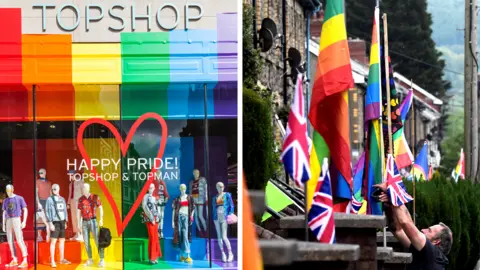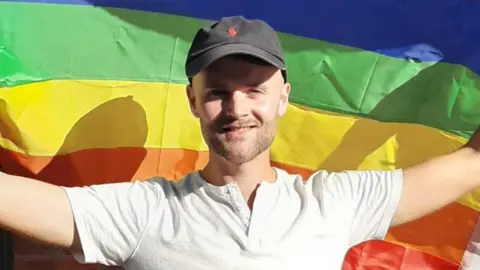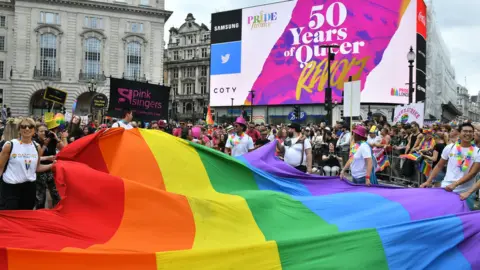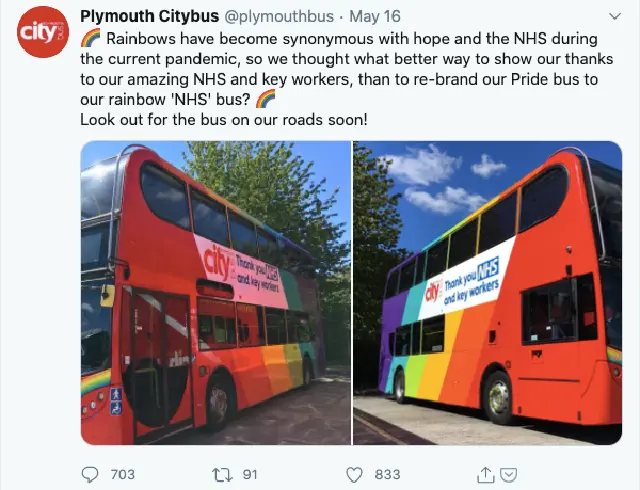Coronavirus: 'I was attacked for hanging my rainbow flag'
 Alamy/Reuters
Alamy/ReutersWhen Alex Hancock put a rainbow flag in his window, he was subjected to homophobic abuse and a death threat.
Ten months on, his street - and much of the country - is covered in rainbows, to represent support for the NHS.
But Alex, 32, and other lesbian, gay, bisexual and transgender people, are now worried about losing an important emblem of LGBT identity and support.
Since its debut in San Francisco, 42 years ago, the rainbow flag, has become the most popular symbol of LGBT rights.
And account manager Alex, 32, flew one outside his home to celebrate last year's Manchester Pride weekend.
But just a few hours later, he faced abuse.
"I was loading some stuff into the car and a couple of young guys started walking towards me," he says. "They had obviously seen my rainbow flag. And they suddenly started shouting homophobic abuse at me.
"They threatened to kill me."
Now, homes and businesses across the UK are displaying traditional seven-colour rainbows to show support for the NHS. But some, perhaps unknowingly, are using the six-stripe LGBT Pride emblem for the same purpose.
 Alex Hancock
Alex HancockAlex says he is now less likely to be attacked for hanging his flag. But he is concerned this has come at a cost.
"There are homes on my street with more rainbows than mine," he says. "A few weeks ago, nobody would have looked at a rainbow and thought, 'That's to do with the NHS.' It's such a difficult thing to talk about, because I try to stay positive and I think the NHS is one of the best things about the UK.
"But at the same time, I do think it's unfair. What will our rainbow flag be if wider society sees it as something different?"

- RISK AT WORK: How exposed is your job?
- SCHOOLS: When will children be returning?
- EXERCISE: What are the guidelines on getting out?
- THE R NUMBER: What it means and why it matters
- LOOK-UP TOOL: How many cases in your area?

The LGBT rainbow has become a summer feature on many high streets, as retail chains and others businesses have taken to displaying it to show solidarity in the run-up to LGBT Pride street celebrations. And that has led to criticism the events are becoming too commercialised.
But the cancellation of Pride parades this year because of the coronavirus pandemic has led to unsold rainbow merchandise and unaired commercial campaigns.
 PA Media
PA MediaAnd this, in turn, has seen some enterprising corporate cheerleaders for Pride publicly switch their support to the NHS - in some cases, retaining the six-colour LGBT emblem rather than adopting the more traditional seven-stripe rainbow.
In August 2019, Plymouth Citybus unveiled a passenger bus covered in a six-colour rainbow to show their "appreciation for Pride". But on Saturday, the company tweeted a now-viral picture announcing it would now be a "rainbow NHS bus". And while some responses were positive, most felt the sudden "insulting", "ill conceived" and "offensive" "rebranding" was "erasing" their identity.
"Our Pride flag is not for sale," one gay writer tweeted. Another simply said: "Thanks for just straight up erasing my identity there."
The bus company later apologised for causing offence. But it is not alone.

A staff member told BBC News one of Britain's leading High Street retailers had planned to release rainbow merchandise supporting the NHS, featuring "a very similar design" to their recently cancelled Pride campaign.
"Our Pride campaigns are planned months in advance and a lot of money goes into the designing, making and marketing," they said. "You can see why brands would want to shift their products now that Prides aren't happening."
After the retailer's LGBT employee network complained, plans for the products were shelved.
But "Thank You NHS Flags" are still selling out in some online stores, without sellers mentioning their original Pride festival purpose.
Allow X content?
Back in the north of England, meanwhile, a gay hospital doctor, who wants to remain anonymous, says he feels "more than happy" about the rainbow being used by children - but not by brands.
"We gays don't own rainbows - but the commercialisation of Pride and now the NHS is disgraceful," he says. "As if it wasn't problematic enough for people to sell things supporting us without donating any money to LGBT causes, they're now jumping on a new trend and pretending we don't exist anymore."
And LGBT Foundation Pride co-lead Joe Nellist says many have been left angry and upset by some "well-intentioned" rainbow gestures supporting the NHS.
"There is genuine fear that its use as a symbol of hope for the NHS will lead to the disassociation of it as a symbol of LGBT equality," he says.
